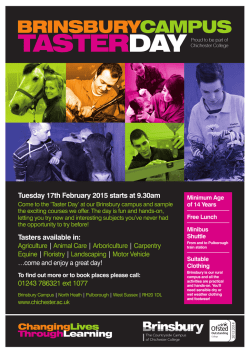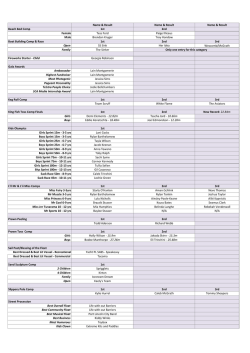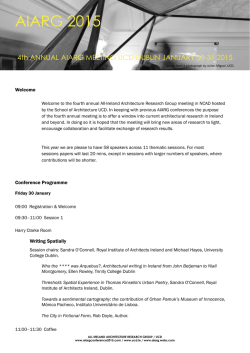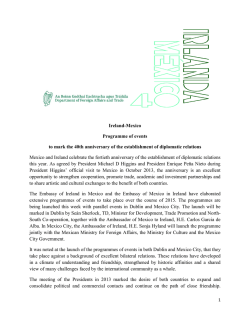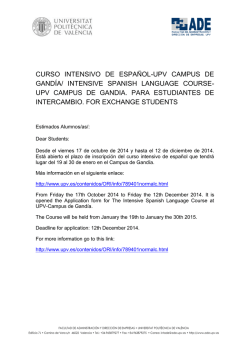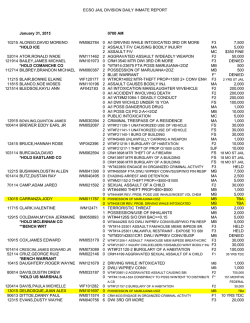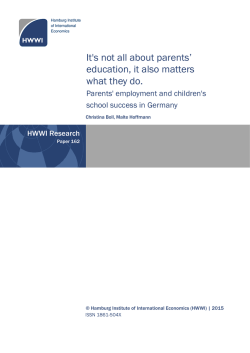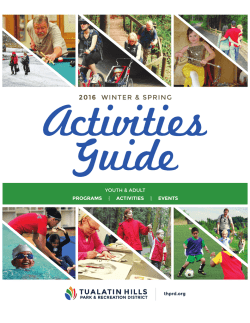
CTYI Summer Brochure OS 2015
CTY Ireland 3-Week Summer Academic Programme By Director, Dr. Colm O’Reilly In 2015 CTYI are celebrating our 22nd annual summer programme. In that period over 20,000 students from both Ireland and overseas have participated in CTYI Programmes. I would like to welcome any new students to DCU this summer and I also look forward to reconnecting with some familiar faces. The great thing about CTYI is that there is something for everyone. Just take a look at the exciting courses that we have on offer this year. It’s a diverse mix of topical subjects that reflects the wide interests of our demographic. Our academic standards are high and we will require commitment and self discipline from you. You will have the opportunity to study advanced courses at a pace suited to your learning ability and to develop good study skills. You will also experience university life on a daily basis. However as anyone who has ever been on this programme will tell you, CTYI is definitely not all about academia. The social side of the programme and the friendships made can be a life changing experience. The staff, many of whom are former students are specifically trained to make sure that you have the best possible time while you are on this programme. CTYI is about giving you a chance to fulfil your potential. I encourage you to take this opportunity and join us in DCU this summer. Colm Prof. Brian MacCraith, President of DCU Dublin City University is Ireland’s youngest university. Just 30 years old in November 2010, it currently has a student population of over 11,000, including 2600 postgraduate students, of which more than 750 are research postgraduate students. Moreover, DCU is global in its focus and has a very international campus profile with close to 2000 students from 115 countries outside Ireland. DCU is an innovative and dynamic institution. Radical in its strategy from the outset, it has always been particularly responsive to the needs of business and industry, both in its programmes of study and its research. It is characterised today by a focus on innovation and entrepreneurship, an ability to move quickly and effect change. DCU is home to world class research centres that focus on translating their outputs into societal and economic benefits. DCU has the highest research income per faculty member of any Irish university and is committed to continuing its vigorous contribution to the development of Ireland as a globalised knowledge society. In 1992, the Irish Centre for Talented Youth (CTYI) was established at DCU to meet a long-felt need by providing recognition, encouragement and challenge for academically talented students and guidance for their parents and teachers. CTYI has had the invaluable advice and assistance of the highly successful Johns Hopkins University Center for Talented Youth in the early stages of planning and in continued support over the years. We share the same educational philosophy and the same commitment to nurturing and challenging academically talented young people and assisting them to fulfil their intellectual potential. CTYI is one of the jewels in DCU’s crown. It has a long record of stimulating and exciting talented students. Beyond that, it is also a place where many lasting friendships begin! Professor Brian MacCraith President Dublin City University Courses 2015 Humanities* Sciences** App Design & Development Behavioural Psychology Criminology Cutting Edge Science Game Theory Japanese Marine Biology Medicine Music Production Philosophy Social Psychology App Design & Development Behavioural Psychology Cutting Edge Science Game Theory Marine Biology Medicine Music Production Robotics Social Psychology Humanities* Sciences** App Design & Development Art & Design Behavioural Psychology Biotechnology Computer Gaming Forensic Archaeology Law Medicine Musicology Philosophy Popular Fiction Social Psychology Veterinary Science App Design & Development Art & Design Behavioural Psychology Biotechnology Computer Gaming Engineering Forensic Archaeology Medicine Musicology Social Psychology Veterinary Science Humanities * - Courses available to high scorers in Critical Reading and/or Writing Skills. Sciences** - Courses available to high scores in Mathematical Reasoning. Course Structure, Choices & Allocation Designed to be intellectually stimulating, courses at CTYI are fast paced and cover material in more depth and at greater levels of complexity than is usual at post primary school. Over 25 courses are on offer, many of which deal with topics not normally encountered in post primary school. Textbooks and handouts, where required, will be prescribed on arrival. These are included in the course fees. Course Structure Eligibility for participation in the courses listed in this catalogue is based upon SAT, PSAT, ACT test or equivalent exam scores and the student’s age at the time the test was taken. Applicants should consult the accompanying eligibility tables. CTYI students are generally between 12 and 17 years old. They qualify for CTYI courses by taking the PSAT through CTYI’s Talent Search or by taking the PSAT or SAT independently at any age. Those whose first scores do not qualify them for CTYI courses often take the PSAT again at a later date and may establish their eligibility for courses in subsequent years. Students need qualify for CTYI Academic Programmes only once: they remain eligible regardless of which year they choose to reapply. Some CTYI students retake the SAT/PSAT each year in order to keep track of how their mathematical and verbal reasoning abilities are growing. Students who score on the 95th percentile on a recent educational psychologist report are also eligible to participate in CTYI programmes. This report must be submitted to CTYI before registration. Students take one subject, which they study intensively for approximately 100 hours over the 3 weeks. Class sizes are small with 18-20 students. Overall, the student to staff ratio is approximately 5 to 1. Classes have an instructor, a teaching assistant (and a residential assistant). CTYI staff are chosen on the basis of mastery of the subject, enthusiasm and good communication skills. Homework will be assigned and this will take about two hours per day to complete. Written evaluations of academic performance will be posted to each student six weeks after the end of the course. Course Choices Students should think very carefully about their course choices, listing only those courses which they will accept if they do not receive their first choice. The more flexible students can be, the greater their chances of being assigned to a course. We sometimes receive more applications to the programmes than there is space available. If this is the case, we then assign students to courses on a priority basis. Priority is based on previous course work with CTYI, participation in CTYI Talent Search and SAT/PSAT scores. Students are not assigned to courses on a first-come, first-served basis although we do encourage students to apply as early as possible as this gives our office more processing time. Applications should be received by 10th April 2015. Students may attend for One or Both sessions. Course Allocation Course assignment packs will be posted as soon as possible after 10th April to students who have been allocated places. Students who have not been offered places may choose to have their deposit returned or apply for any places which have not been taken up. (Please note that refund requests must be made in writing). CTYI reserves the right to cancel or alter any course if, due to unforeseen circumstances the course cannot be run economically or efficiently. Students who apply by 30th January 2015 (early application deadline) will receive one of their course choices. Students who pay full fees by 30th January 2015 will receive €100 discount off their total fees. Please note that early applications are not guaranteed their first (course) choice. Note to Returning Students Enrolment is limited in many of the courses. Please do not assume that because you have participated in CTYI previously, you will receive your first choice. It is very important for you to list alternatives. Student Life Approximately 250 students and 65 staff attend each session at CTYI. About 50 members of the student group are international students. Residential students live in the campus residences at Dublin City University, housed in either a two-bedroom or six-bedroom apartment. Nearly all rooms are single however from time to time we use twin rooms. Bedroom allocations are made according to class group and student age. Thus, students cannot choose their roommates. Please note students are segregated by gender in the accommodation buildings. Thus, male students are not permitted to visit female students in their rooms and vice versa. The RAs are usually university students who stay in the Campus Residences with the students. They are assigned small groups of students (15-20), and they are responsible for the leisure and sporting activities and the out of class supervision. In general, they help students adjust to life at CTYI. They encourage a friendly and supportive atmosphere among the students and ensure that they observe the rules of the programme. They are always available to talk with students about their concerns, be they academic, social or emotional. The RAs are a bright and caring group of people with a wide range of interests and experiences. Facilities available on campus include the library, bank, interfaith chaplaincy centre, launderette, restaurant and shops. Students must not leave campus at any time except with the express permission of the Director or a senior staff member authorised for this purpose. Failure to comply with this regulation will result in immediate dismissal from the programme. Students off campus and unsupervised by a CTYI staff member are not covered by the university insurance policy, and neither Dublin City University nor CTYI accept liability for them. Students are in class for five hours each weekday. Class takes place between 9.00am to 3.00pm, with a short break around 11.00am, and an hour for lunch. Between 3.00pm and 6.30pm students attend recreational activities, meet their RA and have dinner. The activities are supervised by the RAs with students choosing from a wide range of options, which could include team and individual sports, board games, discussion groups, drama, reading etc. In the evening, students return to their classrooms for a two hour study period after which they have social time and meet informally with their RAs. “Lights out” is at 10.30pm. ▪ 8.15am - Breakfast (Residential students only) ▪ 9.00am - Class (There is a 15-min break mid-morning). ▪ 12.00pm - Lunch ▪ 1.00pm - Class ▪ 3.00pm - Recreational Activities ▪ 5.15pm - Dinner ▪ 6.30pm - Study ▪ 8.30pm - Social time ▪ 10.00pm - Residential students go to their rooms. Commuters sign out. ▪ 10.30pm - Lights Out A varied programme of sport and recreation has been arranged in conjunction with the academic programme. During the time they are not in class, students are supervised by Residential Assistants (RAs), and their time is highly structured. Classes are not held over the weekend, and study is on Monday to Friday evenings only. There is a full schedule of events at the weekend that may include sports, shopping, sightseeing and the like. Weekend activities include special events such as discos, movies, a student Talent Show and quizzes. The weekend schedule allows time for doing laundry, writing letters, relaxing, socialising and attending religious services if so desired. All weekend activities are supervised by the residential staff. Some students approach their first experience at CTYI with a little apprehension. We would suggest that you try to encourage your children to overcome these normal and natural apprehensions. However no matter how enthusiastic you may be about the programme, we do not recommend that you send very reluctant children to CTYI. Being away from home especially for the first time can be difficult for some students so CTYI make every effort to create a warm and supportive environment. Many students who were homesick at first are among those most reluctant to see the programme come to an end. Students may leave the programme at weekends although we suggest that parents do not take their children away at this time as a full recreational and social programme takes place. This time is important for students to establish friendships and become fully involved in residential life. Commuting students are strongly encouraged to take part in all weekday and weekend activities. Services provided on campus will normally be limited to first aid. Students may be referred by CTYI to other health care facilities e.g. private clinics, general medical practitioners or hospitals for conditions requiring additional diagnosis and care. Parents will be notified immediately in the event of a more serious illness or injury, or it is felt that the student should see a healthcare professional. Families are responsible for the costs of prescriptions and transport costs to and from medical centres and any health care beyond that provided free of charge on campus. Please note that these costs must be paid for immediately. In the event that a student needs to see a healthcare professional, we encourage parents to bring them. Where not possible, CTYI will make the necessary arrangements to take the student. Overseas Students: CTYI requires documentary evidence that a student’s medical insurance will cover his/her stay in Ireland. Specific information will be included in the acceptance pack that will be posted in May. In general your child should bring warm, comfortable clothes for class, sports and other recreational activities. As the weather in Ireland is notoriously changeable, CTYI suggests that students bring clothing which can be layered and also bring a warm, waterproof jacket or coat along with waterproof shoes for field trips and outings. (See What sort of clothes should I bring? in FAQ). They should also bring general class materials (paper, pens, pencils, notepads, dictionaries, calculators, etc.), alarm clock, towels and toiletries. No water guns, bicycles, skateboards, large equipment (TV, stereo, etc.) or time consuming games such as video or computer games are permitted. Students will not be required to bring bed linen as this will be provided. (Towels are not provided). The use of cell/mobile phones is confined to those times when students are not engaged in class or activities. (CTYI highly recommends that parents take out insurance for these items). Rules concerning their use will be explained to students on their arrival to the programme. There are excellent computer facilities for those courses that require computers. We do not allow students to bring their laptops or tablets to CTYI as word processing facilities and Internet access are available at specific times during class and study period. Email facilities are not available in campus residences however there will be time during the programme when students can access their email. While we recommend that students should, where possible, attend on a residential basis, we appreciate that for a variety of reasons this may not always be possible. CTYI encourages nonresidential students to stay for evening study period and leave campus at 10.00pm. There are approximately 500 places available, i.e. 250 on each of the sessions. 10% of students attend from overseas, mainly from the US however, we also have students from the Far East, the Middle East, Africa, Australia & Europe. Yes – there are normally a number of trips off-campus for example trips for shopping and sight-seeing at weekend. In a number of subjects there are also field trips which form part of the course content. You will receive notification of acceptance as soon as possible after the application deadline (10th April 2015). Refunds are not generally given to students who withdraw unless in very exceptional circumstances. Requests for refunds must be given in writing to the CTYI Director and are given solely at his discretion. Students must avail of the safe-keeping facilities that will be available for passports, return plane tickets and important papers when they arrive at the site. They may pick up these items on departure day. We suggest that parents give their child their normal amount of pocket money that they would have at home. The only items that stu- dents may wish to buy would be soft drinks/ sweets and a small number of optional off campus trips such as cinema or bowling where there is an entrance charge. Students may keep their money in a locked safe in the site office and they will be able to access it whenever they need it. There are three ATMs on campus. In most respects, dress at the Dublin site is the same as US sites. Students normally wear casual clothing for classes and activities and perhaps dress up a little more for discos and the closing ceremony. Please label ALL clothing with student’s identification details. Temperatures in Dublin for the month of July range from 12-24 degrees Celsius. CTYI would suggest that students bring clothing which can be layered and also a heavy sweater and raincoat are recommended for cool evenings and in case of rain. Please note that if students are wearing inappropriate clothing they will be asked to change. All students who complete a CTYI course receive a CTYI certificate. In addition, students receive a written evaluation of their performance on the course six weeks after course finishes. Our principal aim is to choose subjects which are both interesting and challenging for the students. We try to find material that students Parents must report to the Site Office upon would not usually have access to in school. arrival at the campus. In the interests of students’ security, it is very important that we Typically courses in this programme (for stu- know what visitors are on campus. In particudents 12-17 years) cover first year university lar, parents are not permitted to enter the stumaterial. In areas such as Maths the courses dents’ residence unless accompanied by a may include some introductory material e.g. member of CTYI staff. All students must be some algebra, which is necessary to cover in signed off campus when leaving with parents. order that students can follow the core materi- Students must sign back in at the site office as soon as they return. al. If students are travelling without an adult and arriving at Dublin Airport students will be met in the arrivals hall area of Dublin Airport by a CTYI representative and will be taken to the site. A fee of €50 (one way) or €100 (round trip) will be charged for this service if required. We insist that students should not leave the Arrivals Hall area until they have been met by the CTYI representative. Our staff will be clearly identifiable with CTYI signage or sweatshirts. We would ask students to be alert when they reach the arrivals hall and be on the lookout for our staff. We will contact parents ahead of their child’s arrival to CTYI with more details about their collection. We advise parents not to visit their child during the programme because of its intensive nature. If however, you wish to take your child off campus for a special event at the weekend please email [email protected] to arrange this activity around the student’s schedule. CTYI recommends that students leave campus during the inter-session weekend to stay with family or friends if possible. However, if your child needs to stay on campus CTYI will provide room, meals and supervision for a fee of €100 per night. “I have finally become the person I was supposed to be.” (Student quote) Discipline CTYI demands the same standards of behaviour which one would normally find in a caring well-organised home. Cleanliness, honesty, co-operation and respect will be expected from all students. Rules concerning student conduct will be explained at the beginning of the session. Our rules are for the safety and well-being of all students, hence, we ask both parents and students to co-operate fully with the programme. Students may be immediately dismissed from the course for any of the following reasons:** ▪ Bullying ▪ Possession or use of alcohol, drugs or a substance controlled by law ▪ Being off campus without specific authorisation ▪ Being in restricted areas of the campus (including parts of the Residential Building) unaccompanied by a CTYI staff member ▪ Violating or putting at risk the safety and well-being of any person ▪ Residential students being absent from your room or campus residence between "lights out" and "morning call" Students may be subject to dismissal from the course for any of the following reasons (on a case by case basis):** ▪ Punctuality (applicable to all aspects of the course) ▪ Stealing ▪ Vandalism ▪ Bullying ▪ Possession or use of tobacco or e-cigarettes ▪ Not attending satisfactorily to their academic work ▪ Abusive language in verbal or written form to students or staff member ▪ Inappropriate behaviour on or off campus ▪ Using computing facilities for purposes other than assigned course work **For other reasons which in the opinion of the director are of a sufficiently serious nature to warrant dismissal General Rules Students may not contact a staff member on any social network unless the account is a registered CTYI one Students may not take a picture or video of a staff member without their permission Students should not interact with those who are not part of the programme during their time on campus Students should not use mobile phones or mp3 players at unauthorised times – i.e. during class/activities Important to Note Students who violate programme rules are subject to the disciplinary actions outlined below. No refunds will be made to students dismissed from the programme. Students and their families will be billed for any damage they cause. No evaluation for the course will be given to a student who has been expelled. Insurance Students of CTYI are covered by Dublin City University’s public liability insurance policy while in the care of CTYI. This cover does not extend to students who leave campus without permission or without a staff member in attendance. Previous CTYI students may not visit current students during the programme. A student who has been dismissed from the programme will no longer be the responsibility of Dublin City University or of CTYI once his or her parent/guardian or a person nominated by him or her for that purpose has been notified of the impending dismissal and given reasonable time to make arrangements to receive the student. It is the responsibility of the parent/guardian to ensure that he or she or a substitute authorised to act on his or her behalf is contactable and available to receive the student in the event of dismissal. CTYI staff will assist in making travel arrangements for the dismissed student, and escort him or her to the airport or other departure point. Travel Arrangements Arrival & Departure Days Session 1 All residential students attending Session 1 must arrive on the Arrival Day (Sunday, 21st June) and leave campus by noon on the final Friday (10th July). All commuting students attending Session 1 must arrive on the Arrival Day (Monday, 22nd June) and leave campus by noon on the final Friday (10th July). An orientation session for commuting students will take place on Saturday, June 20th, 2015. Session 2 All residential students attending Session 2 must arrive on the Arrival Day (Sunday, 12th July) and leave campus by noon on the final Friday (31st July) as CTYI staff is only employed until this date. All commuting students attending Session 2 must arrive on the Arrival Day (Monday, 13th July) and leave campus by noon on the final Friday (31st July) as CTYI staff is only employed until this date. An orientation session for commuting students will take place on Saturday, July 11th, 2015. Overseas Students Arrival When booking flights, please note that students should not arrive any earlier than the morning of, Sunday, 21st June (for session 1) or; Sunday, 12th July (for session 2) Please note, we are happy to accommodate flights arriving at ~6am! Departure On homebound flights, flights must depart from Dublin airport no later than 2pm on the day of departure; Friday, 10th July on session 1 or; Friday, 31st July on session 2 If students cannot depart from Dublin airport before 2pm on Friday, 31st July, they MUST book a flight on Thursday, 30th July. Shuttle Service Airport/Train Station Shuttle Service will be available on arrival and departure days to students only (not to family members) from Dublin airport, Busaras Bus Station and train stations. Details will be provided in the acceptance pack. Course Descriptions App Design & Development Session 1 & 2 Once upon a time you needed a desktop PC to run an application, but nowadays the humble app is big business and can be found on phones, tablets, even televisions. Makers of these devices usually provide access to all the software you need to develop your own “killer app” and this course aims to provide students with the tools to do just that. This fast paced course aims to give students a well-rounded understanding of what is required to make both functional and user-friendly apps for Android and iOS devices. Starting with the MIT App Inventor software, students will rapidly develop several generic applications and following a crash course in user interface design will then be challenged to design and build apps of their own. The course will also include case studies, best practices in development and building apps in, and for, web browsers. Can’t tell your API from your SDK? Don’t worry, the whole course will be taught from first principles! Art & Design Session 2 This course will explore innovative and creative thinking processes and will investigate what is art and what is design ?. By considering innovative materials, product design, contemporary Art, spatial thinking, visual communication, shape, form and scale, this course will be an exciting hands on and experimental exploration of the creative potential within art and design. Students will go on field trips to art museums to research what is art and will also find inspiration at outdoor spaces and art centres for their own projects. There will be the opportunity for students to showcase their designs and artworks at the end of the course. Behavioural Psychology Session 1 & 2 This domain of psychology is based upon the concept that behaviours can be explained through observation, and that individuals behave according to their environment. It contends that our actions are a response to stimuli. This course will bring into sharp focus the environmental component of the nature:nurture discussion. Assuming that each of us is born with a blank canvas, it will seek to better understand the impact of different life experiences and environmental factors. Students can expect to learn about the work of Skinner, Pavlov, Thorndike, Erikson, and Bandura. With a myriad of fascinating topics, including, fight or flight syndrome, overcoming fears, conformity, aversion and altruism, students on this course will sit back, observe and develop their own conclusions as to why human behaviour is as it is. This will be a highly interactive course, with a strong research component. Biotechnology Session 2 (Scholarship available) Biotechnology is the fascinating study of how living organisms can be manipulated to improve many areas of society. This course will investigate how animals and plants are cloned and why and how the fields of pharmaceuticals, medicine, food and agricultural have all advanced using this form of biological engineering. Famous case studies, such as Dolly the sheep, and the controversy behind Monsanto's genetically modified fertilizers, will be discussed. The ethical dilemmas of using biotechnology, especially in the case of human and animal cloning, and also in genetically 'designing' babies to have particular traits, will be debated. The course will also have a strong practical element with students carrying out related experiments in a biology laboratory, including: amplifying DNA using polymerase chain reaction (PCR); growing microorganisms; extracting DNA; microscope work and more. Visits by guest speakers and project work will also be included. Computer Gaming Session 2 This course is an introduction to computer game design and programming. Programming will be done with the popular and user friendly Game Maker program. By investigating the history of computer gaming, and through modelling of retro games, each student will build up their knowledge of good game design. Exercises on the programming of different types of games (puzzle, platform) coupled with tutorials on coordinate geometry, animation, logic and good programming technique will equip students with all the tools needed to complete an individual game de- sign project. The course will also take a look at the consistently growing computer gaming industry. With advancing technologies like motion detection, new applications such as health and fitness, and a huge online target market, the gaming culture is changing. These changes and their positive and negative social implications will be analysed during the course. Criminology Session 1 What is crime? Who commits crime? Why do people commit crime? How is crime dealt with? Criminology is the scientific study of the nature, extent, causes, and control of criminal behaviour in both the individual and in society. This course will delve into many areas in an attempt to explain crime and criminal behaviour. The course will start by assessing the different theoretical perspectives which attempt to offer a scientific study of ‘crime’ and the ‘criminal’, from classical to contemporary theories. We then take a more practical approach, reviewing topical criminal justice issues in Ireland and elsewhere such as crime rates, media and crime, policing, poverty and sentencing policies. We conclude with an overview of studies in penology and penalty, theories of the prison and of alternatives to imprisonment. There is also normally the option to visit the Four Courts and Mountjoy Prison. Cutting Edge Science Session 1 Science is a philosophy rooted in seeking out the observable objective truths of the world, to be on the cutting edge of Science research is to be involved in the discovery of previously unknown knowledge and its utility in the modern world. This course will explore the cutting edge of scientific research in the fields of biology, chemistry and physics and importantly will look at the multidisciplinary nature of cutting edge research. No longer do these fields reside and live in isolation, in fact the most interesting and redefining research happens at their intersection, modern cybernetic prostheses incorporate physical and engineering principles while literally integrating with the human biological system, biotechnology firms synthesise plastics and other highly sought after chemicals via microbiological pathways and while the materials needed for modern space exploration efforts are the result of years of cross disciplinary research in the fields of physics and chemistry. This course will incorporate both practical and theoretical elements to equip students with a critical understanding of the cutting edge of scientific research and application. Engineering Session 2 In reality, without engineers, the world would fall down around our ears. Yet, most of their work goes largely unnoticed. If we examine the world around us, practically everything manmade that we can see, an engineer has been involved in it. This course introduces the basics of the various fields of engineering. The class will work on developing the problem solving and communication skills that are essential for a career in Engineering. We are faced with basic needs in everyday life. It is these needs and providing for them that fuels the problems for which engineers must provide solutions in the most efficient, socially aware, aesthetic and cost effective manner. Civil Engineering: buildings and roads, Mechanical Engineering: machinery and manufacturing, Electronic Engineering: circuits and robotics, Computer Engineering: programming and hardware. As the Engineering umbrella covers so many areas, this should prove to be a demanding, interesting, challenging and extremely enjoyable course. Forensic Archaeology Session 2 (Scholarship available) Wide batteries of scientific techniques are available to archaeologists to glean information about everyday human life and environment in the past. This course will focus on preserved human and animal remains from distant times up to World War I. It will explore pathology, osteology, entomology, geology, palynology, dating techniques, toxicology, conchology and other scientific investigations and appraise how these studies have transformed our understanding of our collective past. Included are: Pathology; Interpreting battle site trauma; Human Remains Processes of preservation; Genetics and DNA; European Stone Age burials; Post mortem examinations of Peruvian mummy bundles, Ice Mummies, European Bog Bodies and Ice Age mammals; Traditions of Human Sacrifice; Human and animal bone pathology; Animal butchery reconstruction; Assessing diet from human remains; Victorian Burial Customs; Archaeology of the Western Front & Finding the Fallen; The Franklin Expedition – Anthropology and Autopsy; Shell midden analysis; Human and Animal Bone analysis; Medieval cesspits; Mummification processes; Archaeology of Plague and Pestilence; and Torture and Execution – skeletal evidence. Course participants will be afforded the rare opportunity to examine at close quarters an extensive collection of archaeological and comparative human and animal osteological material in addition to artefacts, microfaunal and palaeobotanical samples. Practical sessions will include analysis of excellently preserved plant, human and ani- mal remains recovered during the excavation of medieval period sites in Dublin. Case studies from around the world will be cited, drawing these threads of investigation together. This course will include a number of field trips. Game Theory Session 1 (Scholarship available) Game theory is the study of strategic interactions. This course is about asking what happens when people or things with different incentives or motivations interact against one another to achieve their own best outcome. It has become the underpinning of evolutionary theory, economics, business processes, international relations, and is the subject of major motion pictures, like ‘A Beautiful Mind’. In this course we will discover the laws underpinning every game and study specific examples of different types of games taken using examples from literature, the movies, board games, economics, molecular biology, international politics, business studies, dating, game shows, government funding opportunities and, of all things, fuel injection mechanisms in cars and the songs of the Dunes in the Sahel. Students will learn to develop their own games and study the development of others. No mathematical knowledge is needed to take the course as all concepts will be developed as we go in a fun and intuitive way, focusing on the ideas and their implications rather than the technical aspects of the theory. Students who care about understanding their world should enjoy this course. Japanese Language & Culture Session 1 This beginners’ Japanese course is divided evenly between Japanese language studies and the study of Japanese culture. Not only does the language section of the course give students a grounding in basic Japanese, it also explores language learning techniques. As well as using traditional learning methods, students will learn how to use technology – such as smartphone apps, youtube, podcasts, etc. – to study a language, skills which are transferable to the learning of languages other than Japanese. Anime is used in the study sessions to help students practice their listening skills. The culture section of the course focuses mainly on modern Japanese society; topics include Japanese cuisine, Japanese cultural identity, natural disasters, and social problems. The course also includes some lessons on more traditional Japanese culture (such as ninjas, geisha, samurai, etc.). In the final week, students will present a research project on an aspect of Japanese culture of their choice. In 2014, we had practical demonstrations given by the Dublin Japanese Drumming Club, DCU Karate Club, and Dublin Kendo (Japanese sword-fighting) Club, and we hope to have a similar line-up this year. This course is perfect for students who are interested in Japan or know nothing about it, and a good introduction for anyone considering taking Japanese at college. Law Session 2 (Scholarship available) How many of us know how the law actually works? It’s around us every day, but for many it remains a mystery. Crime scene shows and courtroom dramas give a glimpse of its inner workings, but even they often don’t tell you the full story. This course has that full story. First, it’s about how law is applied in practice today. At the end of three weeks, you will be able to debunk many of the common myths surrounding the law. Is an accused person always innocent until proven guilty? Is DNA evidence as conclusive as it seems? How do judges and juries really come to their conclusions? With this new understanding of how law is in reality, the class will embark on a course long project to design reforms of the law. Next is how law is written down, in legislation, the Constitution, and in books. We will look at all the main areas that students might encounter (like criminal law, tort, and constitutional law) as well as some of the lesser known areas of study, like media law and sports law. Throughout the course there will be a particular focus on the Constitution and the effect the European Convention on Human Rights has on Irish law. The last part of the story shows you how to ‘do’ law. We will develop some of the most crucial skills that any good lawyer needs: opinion writing, case analysis and, of course, your skills of persuasion, which will be honed in the class discussions that form an integral part of the course. Marine Biology Session 1 With 5,600 km of coastline and 220 million acres of sea territory, Ireland has a huge range of marine life. From tiny plankton to animals like sunfish, basking sharks and humpback whales, the variety of life in the oceans is incredible. From the oxygen you breathe to the food on your table, oceans provide humans with many important goods and services. This course will look at the classification of animals in the sea, the special features of each group and their distribution. Students will learn about food webs, how climate change may impact the oceans and how animals defend themselves from predators. Students will handle animals collected from the seashore, dissect and study the anatomy of fish and observe animal behaviour in videos. This is a course suitable for students with an interest in science, particularly biology and animals. Skills learned in this class may aid students wishing to pursue a career in research or wildlife conservation. Medicine Session 1 & 2 Do you want to be a doctor in the future? If so, why not try this innovative taster course in medicine, which contains both theoretical and practical elements. Students will learn about health and illness with a focus on anatomy, the causes, prevention and possible cures and treatments of various diseases. The course will focus on problem based learning where these health practitioners of the future will be taught the basics of medicine using case studies, evidence from expert speakers and advice from the instructor. Students will visit the hospital wards in DCU School of Nursing to learn more about patient care and will also carry out microscope work in the lab to identify some common bacteria and viruses that cause infection. Debates and discussions on topics such as the value of alternative therapies, should blood and organ donation be compulsory, and is biotechnology the way forward for medical treatments, will be carried out by the students. Music Production Session 1 Never before has Music Technology been so accessible to young producers. All platforms, from the smart phone to the desktop computer are capable of running some sort of music production software putting creative control into the hands of musicians, wherever they are. The Music Technology course will introduce the area of music production and chart its development from analog studios up to modern day standalone computer setups. Each class will consist of theoretical and practical parts. The theoretical side of the course will focus on an analysis of different musical styles and how they are made, science of sound, how waves and frequencies work and what that means for music production, as well as an in-depth look at how digital audio works and its implications for the music industry. The practical side will see the students creating and editing their own recordings with a view to eventually recording and producing songs as a class. This will be done through the Reaper and Apple Garageband music production programs. Musicology Session 2 What makes one piece of music ‘better’ than another? What drives people to make music? What will the music of the future sound like? In this course we will attempt to answer some of these questions by examining music in all its forms, from the earliest work of the ancient Greek minstrels, through the works of classical composers such as Bach, Beethoven and Wagner, to the popular music revolution of the 20th century and beyond. We will study the psychology of music – including the question of whether or not human beings have a natural ‘musical instinct’ – and examine how social and cultural factors influence the music that we make and enjoy. We will delve into the structures of music itself, and learn how a piece of music is constructed by composers and songwriters. We will explore the philosophy of music, from ontology (what is music?) to aesthetics (is music art?). Finally, we will investigate how recording technology has changed our attitudes towards music production, and consider how new technologies such as online streaming and digital downloads will affect our understanding of music in the future. (NB: No previous musical experience, or ability to read, play or compose music, is needed to fully enjoy this course.) Philosophy Session 1 & 2 Philosophy is possibly the most fundamental of subjects as it asks the question: `What does it mean to be?' The aim of this course is to enable students to acquire the basic skills of philosophy i.e. analytic argument and essay writing; and to introduce students to some of the most profound thinkers in history. The course will cover some of the fundamental concerns of philosophy such as: the history of philosophy, metaphysics and epistemology, logic, ethics and political theory, the philosophy of mind. Over the course students will be introduced to the Pre socratic and Greek philosophers, the enlightenment philosophers from Descartes to Kant, and more recent philosophical movements such as existentialism, phenomenology, and linguistic philosophy. In short the course seeks to teach `The Art of Thinking'. Popular Fiction Session 2 Popular Fiction is the fiction of the people; it holds a mirror to society, reflecting our imagined present. While dreaming of science fiction tomorrows and fantastical yesterdays, popular fiction has to fight to be called serious literature. This multidisciplinary course will navigate the fantasy worlds of Terry Pratchett and Neil Gaiman, and discuss how cutting edge technological inventions which leap from science fiction texts such as those of Douglas Adams have influenced modern times. In addition to examining the science of science fiction through exploring time travel and how to reanimate Frankenstein, we will explore the sociological roots of revamps in Horror fiction, and question if sparkling vampires have more bite than their Gothic counterparts, e.g. Dracula. Using Freudian and Jungian psychology we'll psychoanalyse the super-villains of Marvel and DC through Batman’s Arkham Asylum, and unlock the secret story map writers like Tolkien and Rowling have been using for centuries. Students will learn film techniques, and examine popular fiction in different media e.g. video game design and animation. We will produce 3D computer animated characters and Claymation films, and discuss the science of zombies and demonology, while learning how to protect ourselves from the zombie apocalypse. Students will get to grips with Grimm fairy tales, discuss Sherlock Holmes, and examine Anime and media interpretations of popular fiction. Through scrutiny of a broad range of genres, students will produce an in-depth critical analysis. As a final project, students will create their own fantastical universe, creating characters, dialogue and plots, and be encouraged to challenge the tropes of contemporary fiction. Including never-before-heard interviews with Sir Terry Pratchett, and a focus on critical analysis and creative writing, this course will attempt to answer the question; can Popular Fiction give us the answer to Life, the Universe and Everything? Robotics Session 1 These ARE the droids you are looking for! Robotics is a field where science fiction and science fact collide. In 2013 there were over 10 million robots in the world, mostly industrial robots toiling away in relative obscurity, hidden from the humans that depend on them. In the future - with better batteries, computing power and 3D printing driving innovation ever forward - robots will be far more prominent in our lives. Service robots will perform household chores, look after food preparation and make deliveries. Perhaps someday robots will look after the sick and elderly or even be used to guard prisoners. This course will introduce you to the mechanical and electronic design skills needed to physically build and test your own robots as well as providing coding challenges to add artificial intelligence to our creations. You can also expect plenty of thought provoking discussion and debate about the challenges and opportunities facing roboticists in the years ahead. Social Psychology Session 1 & 2 If psychology is the study of human behaviour, social psychology looks at that behaviour in action in the world. This course seeks to impart a detailed understanding of the burgeoning field of social psychology, focusing specifically on the applied use of psychology in the fields of politics, advertising and healthcare. Students will be introduced to psychological theory of attitudes, attractiveness, prejudice, groups and teams, attribution, self-identity and helping behaviour. How do our attitudes affect our behaviour? Can we ever truly overcome prejudice? What is the best way to address racial tension in schools? How important are a candidate’s looks in a political campaign? How do juries behave, what influences them, and why? This wide ranging course will use case studies from Irish advertising campaigns, the healthcare system, recent Dáil elections and the 2008 American presidential campaign to deepen students’ understanding of the structure and function of human behaviour and its effects in the world. Students will conduct and present research to the class on topics of current interest, and will have the opportunity to design and present the results of a psychological experiment of their choice. Veterinary Science Session 2 This course will look at various aspects regarding the cause, treatment and prevention of diseases in animals. The physiology, dietary requirements and the habitat of both household pets and farm animals will be studied. There is an emphasis throughout the programme on problembased learning and the use of case studies to give an insight into the correct procedures to use when treating animals. Students will learn the appropriate procedures to approach, handle and restrain animals in theory and also how to manage livestock in a farm environment. They will acquire a fundamental knowledge of how poor husbandry may contribute to disease. The class will be introduced to clinical cases and the correct methods in diagnosis and treatment of various animals. The characteristics and methods of anaesthetics, sutures, and treatment of all types of wounds will be described. Students will visit the zoological gardens in Dublin to see first hand the physiology of exotic animals and will learn more about some of the most exciting species on the plant including, tigers, snakes and crocodiles. This is a theory based course and suitable for students wishing to pursue a career in the sciences or veterinary medicine. Eligibility for CTYI Academic Programmes SAT ELIGIBILITY CHART HUMANITIES SCIENCES Age taking the PSAT SAT V SAT M up to 13 yrs. 6 mo 13 yrs. 6 mo. to 14 yrs. 0 mo 14 yrs. 0 mo. to 14 yrs. 6 mo. 14 yrs. 6 mo. to 15 yrs. 0 mo. 15 yrs. 0 mo. to 15 yrs. 6 mo. 15 yrs. 6 mo. to 16 yrs. 0 mo. 16 yrs. 0 mo. to 16 yrs. 6 mo. 510 530 560 580 610 620 650 530 540 570 580 600 620 650 PSSS ELIGIBILITY CHART HUMANITIES SCIENCES Age taking the PSAT Critical Reading Writing Skills Math up to 13 yrs. 6 mo 13 yrs. 6 mo. to 14 yrs. 0 mo 14 yrs. 0 mo. to 14 yrs. 6 mo. 14 yrs. 6 mo. to 15 yrs. 0 mo. 15 yrs. 0 mo. to 15 yrs. 6 mo. 15 yrs. 6 mo. to 16 yrs. 0 mo. 16 yrs. 0 mo. to 16 yrs. 6 mo. 51 53 56 58 61 62 65 51 53 56 58 61 62 65 53 54 57 58 60 62 65 The SAT and PSSS are the testing instruments used in the identification of high academic ability. CTYI will also accept other similar test scores, such as the ACT. Students who have been assessed by an educational psychologist may submit this report for evaluation, in lieu of the SAT, PSSS or equivalent assessment. Scholarship Opportunities CTY Ireland are very pleased to announce that a number of organisations have very generously put forward full scholarships for students on the CTYI Summer Programme. The awards cover full tuition, accommodation and books. Deloitte One scholarship is being offered by Deloitte and is open only to students applying for places on the Law course during session 2. Genzyme One scholarship is being offered by Genzyme and is open only to students applying for places on the Biotechnology course during session 2. Valerie J. Keeley Ltd. Archaeological Consultancy One scholarship is being offered by VJK Archaeological Consultancy and is open only to students applying for places on the Forensic Archaeology course during session 2. SIG Susquehanna One scholarship is being offered by SIG Susquehanna and is open only to students applying for places on the Game Theory course during session 1. All scholarships will be awarded on the basis of merit (SAT/PSAT) and/or need (family income). Interested students should complete and return the relevant Scholarship application form before Friday, 10th April 2015. Merit awards and scholarships will be deducted from the total balance after application fees are paid. If you receive one of these awards please enclose the award letter with your application. Partnerships The Centre for Talented Youth, Ireland is pleased to work in association with Matheson, Ireland’s largest law firm, on three projects: CTYI Talent Search, CTYI Summer Programme, and the Centre for Academic Achievement. The CTYI Talent Search is used to identify students to participate on the CTYI programme. Students sit a qualifying test to attend the summer programme. The CTYI Summer Programme offers students the opportunity to study college like subjects in depth over a three week period at DCU during the months of June and July. The Centre for Academic Achievement is a programme run by CTYI and the DCU Access Service which allows students from local DEIS schools to participate in courses at Dublin City University. Under this scheme students can apply directly to CTYI for fee waivers to participate in the CTYI Talent Search and CTYI programmes. CTY Ireland is working closely with Matheson to identify students who may not be able to attend CTYI due to financial constraints. New Scholarships CTY Ireland run classes for over 4,000 students per annum. In 2013-2014 CTYI ran over 100 academic courses at centres nationwide. Student scholarships for courses are provided by Deloitte, VJK Archaeology, SIG and Genzyme. If you are interested in sponsoring a particular course or providing a scholarship for some students please get in touch with CTYI directly at 01 700 5634 or by email at [email protected]. CTY Greece. Study at the birthplace of knowledge! Get the chance to attend the three-week summer 2015 residential program in Greece, at CTY Greece at Anatolia College (www.cty-greece.gr), starting late June 2015. Anatolia College in Thessaloniki, Greece, is a historic American institution founded back in 1886. s lace p d ite 0 Lim 180 € : t os mc a r g Pro CoursesOffered offered: • Probability and Game Theory Courses • Cryptology • Introduction to Biomedical Sciences • Principles of Engineering Design • Introduction to Computer Science • Chemistry in Society, and more! Funded Under the * Program cost includes tuition, room, board and books. Transportation cost to Greece not included. CTY Greece at Anatolia College A Johns Hopkins CTY International Network Member P.O. Box 21021, 555 10 Thessaloniki, Greece • Τel.: +30 2310 398.253 • Tel/Fax: +30 2310 332.625 • www.ctygreece.gr • Application Information Application & Fee Deadlines Early Application Deadline Friday, 30th January 2015 Normal Application Deadline Friday, 10th April 2015 Balance of Fees Deadline Wednesday, 27th May 2015 Late Applications Applications should be received on or before 10th April 2015. We will accept applications after this date but they will only be considered as space permits. Avoiding delays in the application process Applications will not be processed unless full information is provided. An incomplete application slows down the application process and causes unnecessary confusion and delay. Please review your application carefully before posting it. The following items cause delay in the application process: Missing signatures - both the student’s signature and a parent/guardian’s signature are required on the application form. No Application fees enclosed. A registration fee and a tuition deposit are required as part of the application. Not eligible for the requested course. Please read the requirements for each course, particularly the SAT/PSSS minimum required scores, carefully, before making your selection. Scholarship Applications THIS FORM MUST BE RECEIVED BY 10th April 2015. SEND ALONG WITH YOUR CHILD’S APPLICATION TO: 2015 CTYI Older Student SUMMER PROGRAMME CTY Ireland DUBLIN CITY UNIVERSITY DUBLIN 9 IRELAND Requests for Receipts If you wish to receive a receipt for payment of fees, please enclose a stamped-addressed envelope. Receipts are only prepared when the full fees are received. Contact Us Dr. Colm O’Reilly Director 01 700 5634 [email protected] Dr. Catriona Ledwith Academic Coordinator 01 700 8423 [email protected] Dr. Eleanor Healion Academic Coordinator 01 700 8977 [email protected] Ms. Danielle Broomfield Residential Coordinator 01 700 7051 [email protected] Ms. Linda Murphy Student Applications & Fees 01 700 8103 [email protected] General Enquires +353 1 700 5634 [email protected] Terms & Conditions Registration Fee: All fees include a €100 registration fee, which is non-refundable. Late Payment Fee: A late payment fee is applicable on all accounts not paid in full by Wednesday, 27th May, 2015. Students will not be permitted to attend the Summer Programme until all fees have been paid. Returned Cheques/declined Credit Cards: Returned cheques/declined credit cards are liable for a €10 fee to cover handling costs. Please note, your child’s application will be suspended until the payment has been processed. Early Application Deadline: Applications paid in full and received before Friday, 30th January will receive a €100 reduction in fees. Please note that early applications are not guaranteed their first choice (course). Courses are allocated by eligibility scores. Course Allocations: All communication relating to course allocations is communicated by Post. Please do not call the office, as we cannot share this information by any other means. Fees are non-transferable. No refunds will be made to students dismissed from the programme. Students and their families are liable for any damage they cause to university property. CTYI reserves the right to cancel or alter any course, if due to unforeseen circumstances the course cannot be run economically or efficiently. Due to the fact that accommodation and catering costs have to be paid in advance by CTYI an administrative cost will be factored in to all potential refunds. Written requests for a refund of Application Fees received up to and including 10th April will be considered. After this date there will be no refund of Application Fees. Written requests for a refund of Balance of Fees received up to and including 27th May will be considered. Application Fees will not be refunded after 10th April and the Registration Fee is non-refundable. Refunds are only provided where a course does not take place or where a course is full. Refunds are not given if the student withdraws from the programme having been offered a place on one of their course choices. The €100 Registration fee is non-refundable. Closing Date: 10th April 2015 Early Application Deadline: 30th January 2015 Centre for Talented Youth, Ireland Dublin City University, Dublin 9, IRELAND Fax: 01 700 5693 [email protected] www.dcu.ie/ctyi
© Copyright 2026
